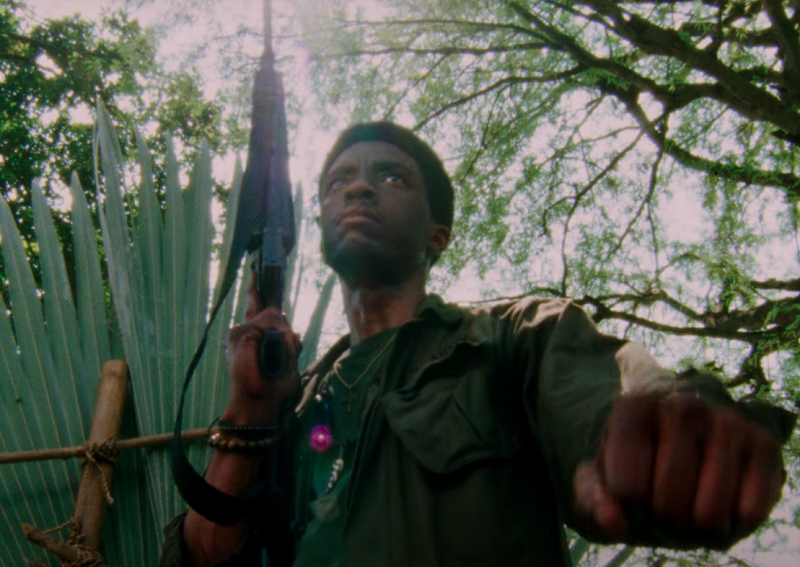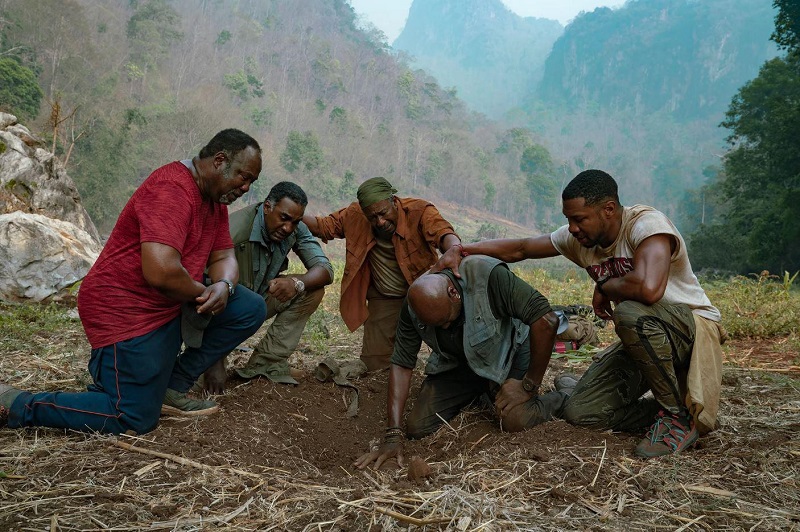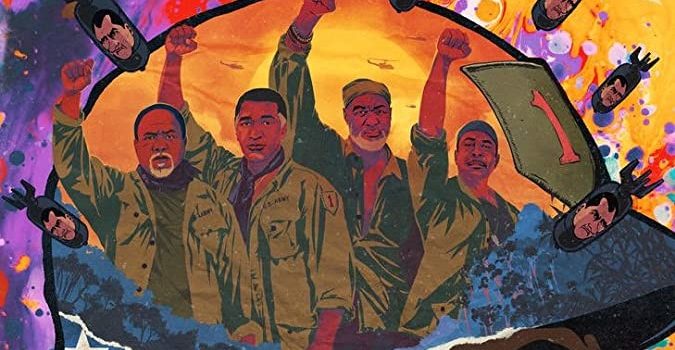If BlacKkKlansman was the film for Spike Lee that kicked open the door to profiling racial divide in America in the age of Trump, then Da Five Bloods is the flick that kicked the entire house down. Debuting on Netflix, the film is one of the best, most extraordinary, and timely films that the streaming giant has premiered.

The film is as much about the bond of brotherhood between five Vietnam soldiers who head back to the country in search of two things they left behind—a case full of gold and the remains of their beloved leader, Stormin’ Norman (Chadwick Boseman). The film skillfully bookends American race relations from the Vietnam war and current events.
The cast is remarkable, top to bottom. One who stands out is Delroy Lindo who goes places with his character Paul that is haunting, unnerving, and most of all—mentally challenged in that we question his mental proficiency, even while he seems to have it all put together. He refuses to get help and his pigheaded ways and violent streaks endanger our heroes’ entire mission. Jonathan Majors is Lindo’s son David and through their relationship, we learn so much about the father. Theirs is a complicated relationship, birthed by tragedy from David’s childhood. That, coupled with Paul’s striking PTSD, serves as a potentially explosive connection. But it has all the potential for being one of the warmer moments in a story that could be clouded with darkness, remorse, and deep pain—caused by battle scars that for anyone who fought, is firmly still very much in their present psyche.
Lindo Paul is the embodiment of Vietnam-specific traumatic stress syndrome. He speaks of nightmares, “seeing the dead” and getting visited by fallen comrades almost every night. Through the actor’s powerful force of nature performance, it comes alive in such a palpable manner that Oscar better be listening as they were during the summer of 2018 when they honored Adam Driver with a Supporting Actor Oscar nod. Lindo utilizes the entire spectrum of the human condition. He has such moments of clarity and then can turn on a dime and be talking to himself or raging towards his fellow Bloods or his son—all with the otherworldly control of an actor who is operating at the top of his game. It’s a mesmerizing turn.
Starring as his Vietnam combat brethren are Clarke Peters as Otis, Norm Lewis is Eddie, and supporting actor extraordinaire Isiah Whitlock Jr. is Melvin. Every single actor in the ensemble is amazing, even a small role shines, for the guy who recently garnered serious Oscar talk for his portrayal of the titular character in Richard Jewell, Paul Walker Hauser. Lest we forget French actress Mélanie Thierry as Hedy and Johnny Nguyen as Vinh, Jean Reno as Desroche and in a pivotal role that was ripped from reality in the form of Van Veronica Ngo as Hanoi Hannah. Adored how Lee painted her broadcasts from North Vietnam, as almost taunting American forces and all who could hear her voice. In Da 5 Bloods, she directs facts at black American fighters, stressing the reality of their fighting for a country that denies them their rights, sends them to die in the jungle while many white folks missed the draft because they got college deferments. It’s a powerful sub-message sewn throughout the story.
If you’ve seen the Da 5 Bloods trailer, then you know that this is, on one hand, a story about a group of soldiers stumbling across a large suitcase full of gold meant for the South Vietnamese in their fight against the north. Led by their exceptional leader Stormin’ Norman (Chadwick Boseman), the 5 decide to bury the gold and come back for it long after the bullets and landmines have silenced and peace rules the land. Lee does something truly fascinating with the flashback on two fronts. As we go back and forth between present and past, Lee changes the aspect ratio of the screen to denote we are in the Vietnam War and also uses the same actors as returning veterans as he does the battle sequences back during the war. Through quit cuts that mirror the bullets-and-bombs flying action, one barely notices the grey in Lindo’s beard. It doesn’t matter. Lee didn’t do a Martin Scorsese and spend millions on de-aging his cast. Instead, he trusted the audience to just accept the fact that these are the same character and their actual physical appearance doesn’t matter. We are with these guys through and through, that is the brotherhood that is established brilliantly between these souls.

There is a simultaneous urgency and appreciate the present tone to Lee’s latest. The battle and “under attack” sequences are impeccably intertwined with beats that allow characters to connect and reconnect. As such, it pulls the audience in and we are as vested in every single one of these souls. Lee’s ensemble is as rich as any in his canon, and yes that is saying something. The way they collectively contribute to the story, there are no leads, per se, this is an all-encompassing ensemble where each time the focus shifts to another character, it is a welcomed moment met with anticipation with what he or she will say and do next. There aren’t many filmmakers today who can craft that kind of characterization meets story movement quotient.
Da 5 Bloods commences in Vietnam during present day. At a fancy Saigon hotel, the guys reconnect instantly in the lobby as we get a quick update on each guy. Soon, we meet Vihn who is charged with getting our guys into the jungle. They make it clear once they get there, they know the landscape and do not require his help beyond that. Discussion ensues, as does always so intellectually in Lee films, about the Vietnam War and its far-reaching implication for Black America and even the locals in country. That kind of awareness permeates the entire film and what makes it so uniquely special. The way that Lee intersperses still photographs and videos from the past, complete with labeling, further makes his point, but as he so brilliantly does—never hits you over the head with it. The filmmaker gives his audience so much to think about, not just after the credits roll—but actively throughout the movie-watching experience. That is just one reason, why a remarkable Lee film so fills one up on so many levels. There’s the emotional connection that goes deep. There’s an intense enlightenment factor that is never preachy, but always more of a celebration of the history that our textbooks probably failed to include.

One such note, when Boseman’s Norman is talking to his charges in the bush of Vietnam about black troops fighting for America to give rights to those overseas that they don’t possess at home, he goes all the way back to the American war that started it all—The Revolutionary War. He points out that the first person to die in the battle for American independence was a black man. “And we’ve been dying for this country ever since.” Given the current climate in American and the world, the timing of this film couldn’t have been more spot-on. Then again, it doesn’t matter the political climate outside the viewing area, Lee’s films are putting a mirror to a society in dire need of change, regardless of what the calendar says. When he released BlacKkKlansman two years ago, he concluded his true story about a black Colorado Springs police officer who infiltrated the KKK with images of white nationals marching in Charlottesville, Virginia—this time, no hoods. As he unveils Da 5 Bloods, he is undertaking a mountain of issues that affect the seemingly never-ending fight for black equality.
The score by Terence Blanchard is sublime. The way that Lee layers Blanchard’s work through his story is one brilliant musical stroke after another. Sure, the music elevates the heart-racing battle sequences, but there are moments where characters are deep in emotive discussion and the score appears to be louder than one would normally hear at the same beats from other filmmakers. It adds to the tension. It adds to the pressure. But most importantly, it fully encompasses and elevates the interactive emotions of our Bloods and those around them. Blanchard’s work was previously eloquently used by Lee in his BlacKkKlansman, The 25th Hour, and the criminally underrated Inside Job.

Adding layers to the musical impact is a duet of sorts visually with the choreography of Newton Thomas Sigel. What’s so fascinating is there is a small parallel in Da 5 Bloods to 1999’s Three Kings. They are both stories about soldiers and gold and wars American boys (and girls) should not be dying in. David O. Russell’s Iraq War classic and Lee’s latest are both shot by Sigel. The most enormous of challenges arrived for the cinematographer with this flick—he had to shoot in Vietnam (whose lush landscapes practically paint cinematic pictures) and do so in two aspect ratios and film tones. The look of the Vietnam War era action and the current day search for gold (and another reason which you won’t hear here) are different, yet the same. It’s a marvel how the shooter made the 1970s footage look like actual film stock from that era and how bright and piercingly clear the modern-day scenes appeared. Between the tweets for the ears and eyes and a story that resonates with the deepest reaches of our hearts and minds, Lee’s Da 5 Bloods is a full-body enlightening entertainment experience.
Grade: A+

